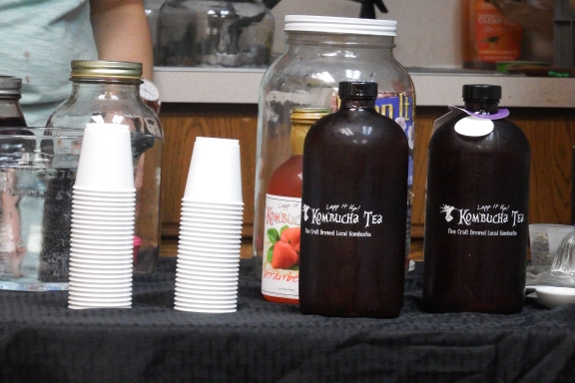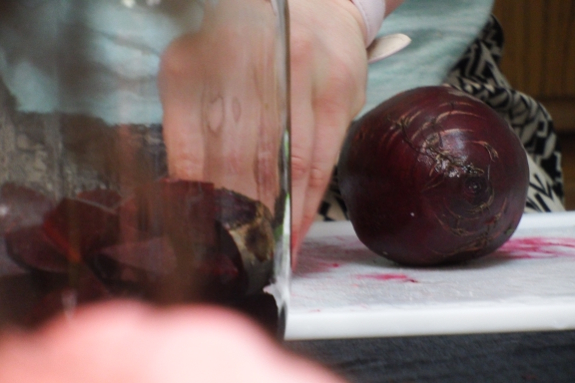
How to make beet kvas

Mark and I enjoyed a
class on kombucha (fermented sweet tea) and kvas (fermented, salted
beets) on Tuesday. I'm not going to try to sum up every little detail
because the internet is full of how-to posts. Instead, I'll just hit
the highlights here.

I'll start with kvas,
the much less well-known beverage. Our instructors washed and cubed
raw, unpeeled beets and filled a glass gallon jar about halfway with
the vegetables. One tablespoon of non-iodized salt plus a quart or two
of unchlorinated water finished the preparation. After that, they let
the crock ferment at room temperature for two to five days then sit in
the fridge for another week to intensify the flavor.
Kvas is meant to be
drunk in small doses to cleanse the liver. The result is something for which I've not yet acquired the taste (although I don't really like beets or salt,
so take that with a grain of, well, salt). Actually, the more
interesting point came from my seat mate, who told me she made a
sweetened beet pie seasoned with lemon zest last year --- now that might be worth a try.
Want more in-depth information? Browse through our books.
Or explore more posts by date or by subject.
About us: Anna Hess and Mark Hamilton spent over a decade living self-sufficiently in the mountains of Virginia before moving north to start over from scratch in the foothills of Ohio. They've experimented with permaculture, no-till gardening, trailersteading, home-based microbusinesses and much more, writing about their adventures in both blogs and books.
Want to be notified when new comments are posted on this page? Click on the RSS button after you add a comment to subscribe to the comment feed, or simply check the box beside "email replies to me" while writing your comment.

Oh you took the class with Junita from Lapp it up I see. Junita is very knowledgeable about her craft. I love her kombucha but haven't tried kvas. I wanted to take the class but since it was on a weekday it just didn't work for me.
Jen
From Wikipedia: "Kombucha is produced by fermenting tea using a "symbiotic culture of bacteria and yeast" (SCOBY). Actual contributing microbial populations in SCOBY cultures vary, but the yeast component generally includes Saccharomyces and other species; and, the bacterial component almost always includes Gluconacetobacter xylinus to oxidize yeast-produced alcohols to acetic and other acids."
What you are drinking is YEAST. Yuck.
Again, from Wikipedia: "There are rare documented cases of serious adverse effects, including fatalities, related to kombucha drinking, possibly arising from contamination during home preparation. Since the mostly unclear benefits of kombucha drinking do not outweigh the known risks, it is not recommended for therapeutic use. Kombucha tea made with less sugar may be unappealing."
Kvas, on the other hand, is a traditional Slavic drink that is also used in making traditional authentic borsch.
@Nayan
Then I hope you don't like beer, cider, wine, bread, grape juice or ripe fruit.
While I must admit that I don't much care for yeast extract (marmite/vegemite), there are some very tasty unfiltered beers (e.g. Weizen, Hoegaarden Wit and other wheat beers).
Probably the most common problem with home fermentation (and biochemistry in general) is hygiene. When you're brewing beer and you have a bacterial contamination in your brew, it generally is pretty obvious from what I've heard from brewers. But with proper cleaning and adding yeast it generally works well. Natural fermentation (without adding yeast) can be hit and miss, depending on which organism colonizes your brew first.
In E. Europe the name Borsch (soft sound "sch", no "t"s) is mostly reserved for a beet soup, the later traditionally made with two day room temperature fermented beet as a principal component (Egyptian Flat variety or a similar one with higher total sugars and of good size are usually used). (Honestly, drinking the fermentation product is less then common.) The crust and outer sides of several day old sour rye bred (kept at room temperature in a kitchen cabinet to collect yeast spores on the surface; the type of substrate and conditions eventually defines the bacterial culture in an open system, e.g. the say way grapes collect yeast spores naturally). Kvas is a lower alcoholic content drink similar to beer, however usually made with barley molasses and stale rye bred or more traditionally rye flour as a substrate for fermentation ("white" kvas); adults and children do drink kvas in warmer season. Also should mention, beet is used as a component is a sour kraut preps in more arid regions (similar to apples I should add), carrots in more northerly areas (and cranberries in the north); the components are either used to increase fermentatable sugar content in the substrate or partially substitute cabbage in the south. (The danger of yeast consumption is anecdotes non-sense; humans evolved consuming yeast and it's spores.)